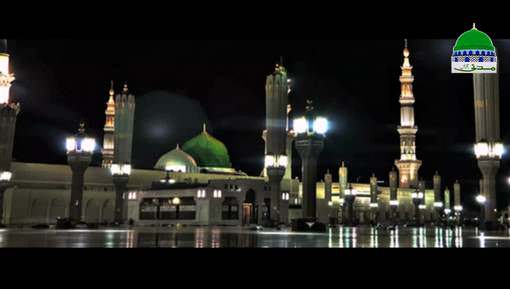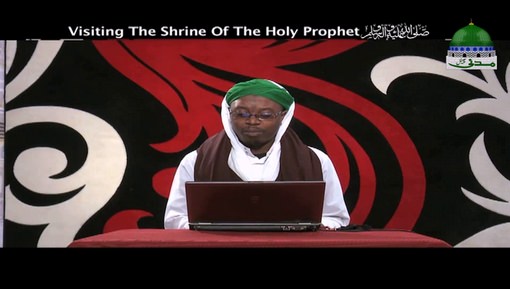
The Revered and Renowned Rasool صَلَّى اللّٰەُ عَلَيْهِ وَاٰلِهٖ وَسَلَّم has said:
مَنْ حَجَّ فَزَارَ قَبْرِی بَعْدَ مَوْتِی كَانَ كَمَنْ زَارَنِی فِی حَيَاتِی
i.e. One who has performed Hajj and visited my grave after my demise is like the one who has visited me in my life. (Shu’ab-ul-Iman, vol. 3, pp. 489, Hadees 4154)
Explanation of Hadees
Ruling on visiting blessed grave
Visiting the blessed shrine of the Holy Prophet صَلَّى اللّٰەُ عَلَيْهِ وَاٰلِهٖ وَسَلَّم is a very great privilege, a great worship, a means of gaining the closeness of the Lord and is nearly Wajib. This ruling has been proved by Quran, Sunnah, Ijma’ and Qiyaas. (Fath-ul-Baari, vol. 4, pp. 59; Shawahid-ul-Haq, pp. 59; Majmu’ah Rasaail Allamah Ali Qari, pp. 197)
Great glad tidings have been given in blessed Ahadees regarding this wonderful action [i.e. visiting the blessed shrine of the Holy Prophet صَلَّى اللّٰەُ عَلَيْهِ وَاٰلِهٖ وَسَلَّم]. The above-mentioned Hadees is also one of them. A leading scholar of Shari’ah Mufti Amjad Ali A’zami رَحْمَةُ اللّٰەِ عَلَيْه stated: If Hajj is Fard, one should perform Hajj first and then visit Madinah. However, while on his way to Hajj, if one can visit Madinah first but he goes to perform Hajj without visiting Madinah, this shows great deprivation and hardness of the heart. One should consider this visit to Madinah a means of the acceptance of Hajj as well as of being blessed with good fortune in religious and worldly matters. If the Hajj is Nafl, he has the choice whether to cleanse himself first by performing Hajj and then humbly visit the blessed court of the Beloved Prophet صَلَّى اللّٰەُ عَلَيْهِ وَاٰلِهٖ وَسَلَّم or to visit the blessed court first. He should consider it a means of the acceptance of Hajj and spirituality in it. Whatever he chooses should do with a good intention, as it is narrated, ‘اِنَّمَا الْاَعْمَالُ بِالنِّیَّاتِ وَلِکُلِّ امْرِئٍ مَّانَویٰ’ i.e. actions depend upon intentions. And for everyone is what he has intended. (Sahih Bukhari, vol. 1, pp. 5, Hadees 1; Bahar-e-Shari’at, vol. 1, pp. 1222)
By Allah! He ﷺ is alive!
Commenting on the words ‘كَمَنْ زَارَنِی فِی حَيَاتِی’ mentioned in the blessed Hadees, Allamah Ali Qari رَحْمَةُ اللّٰەِ عَلَيْه has stated, ‘(The Holy Prophet صَلَّى اللّٰەُ عَلَيْهِ وَاٰلِهٖ وَسَلَّم said that visiting his blessed grave after his apparent demise was like visiting him in his life for the reason that) he صَلَّى اللّٰەُ عَلَيْهِ وَاٰلِهٖ وَسَلَّم is alive in his blessed grave with real worldly life. Therefore, every type of help is absolutely sought from him.’ (Mirqat-ul-Mafatih, vol. 5, pp. 632, Hadees 2756; Lam’aat-ut-Tanqeeh, vol. 5, pp. 483)
3 Sayings of Mustafa ﷺ about visiting blessed grave
In other blessed Ahadees, the following glad tidings have been given to the one privileged to visit the blessed grave:
1 My intercession becomes Wajib for the one who visits my grave. (Dar Qutni, vol. 2, pp. 351, Hadees 2669)
2 One who has come to visit me and has not come for any other need, he deserves that I become his intercessor on the Day of Judgement. (Al-Mu’jam-ul-Kabeer, vol. 12, pp. 225, Hadees 13149)
3 On the Day of Judgement, I will be the intercessor or witness of the one who visits my grave. And the one who dies in [any of] Haramayn will be resurrected by Allah among those granted peace. (Sunan Kubra lil-Bayhaqi, vol. 5, pp. 403, Hadees 10273)
Deprived ones
1 One who has performed the Hajj of the House of Allah and has not visited my grave has been unfair to me. (Majmu’ah Rasaail Allamah Ali Qari, pp. 203)
2 No excuse of the person in my Ummah will be accepted who does not visit my grave despite having the means to do. (Ithaf-uz-Zaair li Abil Yuman, pp. 28)
Pious predecessors visiting blessed shrine of Holy Prophet ﷺ
Blessed companions رَضِىَ اللّٰەُ عَنْهُم and pious predecessors رَحِمَهُمُ اللّٰە would make special preparations for visiting the blessed shrine of the Holy Prophet صَلَّى اللّٰەُ عَلَيْهِ وَاٰلِهٖ وَسَلَّم and would present Salam to his court:
1 After Sayyiduna Ka’b-ul-Ahbaar رَحْمَةُ اللّٰەِ عَلَيْه embraced Islam, Sayyiduna Umar Farooq-e-A’zam رَضِىَ اللّٰەُ عَنْهُ invited him to visit the blessed shrine of the Holy Prophet صَلَّى اللّٰەُ عَلَيْهِ وَاٰلِهٖ وَسَلَّم and brought him to Madinah Munawwarah. (Futooh-ush-Shaam, vol. 1, pp. 235)
2 Sayyiduna Nafay رَحْمَةُ اللّٰەِ عَلَيْه was the slave of Sayyiduna Abdullah Bin Umar رَضِىَ اللّٰەُ عَنْهُ. Over one hundred times, he saw that Sayyiduna Abdullah Bin Umar رَضِىَ اللّٰەُ عَنْهُ respectfully visited the blessed shrine of the Holy Prophet صَلَّى اللّٰەُ عَلَيْهِ وَاٰلِهٖ وَسَلَّم while going on and returning from a journey. (Ash-Shifa, vol. 2, pp. 86; Musannaf Ibn Abi Shaybah, vol. 7, pp. 359, Hadees 11915)
3 Sayyiduna Anas Bin Maalik رَضِىَ اللّٰەُ عَنْهُ would respectfully visit the blessed shrine of the Holy Prophet صَلَّى اللّٰەُ عَلَيْهِ وَاٰلِهٖ وَسَلَّم, say Salam while standing and would return afterwards. (Shu’ab-ul-Iman, vol. 3, pp. 491, Hadees 4163)
4 Sayyiduna Jabir Bin Abdullah رَضِىَ اللّٰەُ عَنْهُ was crying near the blessed grave of the Beloved and Blessed Prophet صَلَّى اللّٰەُ عَلَيْهِ وَاٰلِهٖ وَسَلَّم and was saying, ‘This is the holy place where tears are shed.’ He رَضِىَ اللّٰەُ عَنْهُ further stated that he heard the Greatest and Noblest Prophet صَلَّى اللّٰەُ عَلَيْهِ وَاٰلِهٖ وَسَلَّم say, ‘The place between my grave and Mimber [i.e. pulpit] is one of the gardens of Paradise.’ (Shu’ab-ul-Iman, vol. 3, pp. 491, Hadees 4163)
Eight benefits of visiting the blessed shrine of the Holy Prophet ﷺ
There are countless benefits and blessings of visiting the blessed shrine of the Holy Prophet صَلَّى اللّٰەُ عَلَيْهِ وَاٰلِهٖ وَسَلَّم. The following are eight of them:
1 The Holy Prophet صَلَّى اللّٰەُ عَلَيْهِ وَاٰلِهٖ وَسَلَّم directly listens to the visitor and replies to him. (Majmu’ah Rasaail Allamah Mulla Ali Qari, vol. 2, pp. 205)
2 Islamic scholars said, ‘Visiting to the blessed shrine of the Holy Prophet صَلَّى اللّٰەُ عَلَيْهِ وَاٰلِهٖ وَسَلَّم is a means of the perfection of Hajj.’ (Fayz-ul-Qadeer, vol. 6, pp. 182, Taht-al-Hadees: 8716) The status and rank of the visitor will be raised.
3 He will remain safe from doom and destruction.
4 His difficulties will be resolved.
5 He will be protected from accidents.
6 He will be given good requital in the Hereafter. (Ar-Raud-ul-Faaiq, pp. 307; summarised)
7 He will be blessed with a good end [i.e. he will meet his death in the state of Islam].
8 The Beloved and Blessed Prophet صَلَّى اللّٰەُ عَلَيْهِ وَاٰلِهٖ وَسَلَّم will intercede for him. (Shifa-ul-Siqaam, pp. 103)
Nine manners of visiting Madinah and blessed shrine
Without question, visiting the blessed shrine of the Holy Prophet صَلَّى اللّٰەُ عَلَيْهِ وَاٰلِهٖ وَسَلَّم is a great privilege but it should be kept in mind that one who has been blessed with visiting this court must also conform to manners. A little bit of negligence may result in great deprivation. Let’s now read about some of the manners:
1 When visiting, one should make a pure intention of beholding the blessed grave of the Holy Prophet صَلَّى اللّٰەُ عَلَيْهِ وَاٰلِهٖ وَسَلَّم. There must not be any intention such as show-off or trade, etc. (Mirqat, vol. 5, pp. 631, Taht-al-Hadees: 2755)
2 Recite Salat upon the Beloved Prophet صَلَّى اللّٰەُ عَلَيْهِ وَاٰلِهٖ وَسَلَّم during the journey to Madinah.
3 As the Haram of Madinah approaches, it is better to cry and recite Salat upon the Holy Prophet صَلَّى اللّٰەُ عَلَيْهِ وَاٰلِهٖ وَسَلَّم with your head bowed and then move ahead.
4 Visit the blessed shrine with great humility of the heart and body. Say Salam. If you cannot weep, at least have a weeping look on your face.
5 Try to focus all of your attention to the merciful court of the Greatest and Noblest Prophet (صَلَّى اللّٰەُ عَلَيْهِ وَاٰلِهٖ وَسَلَّم). Refrain from using the mobile phone and taking selfies and ponder that you are present in a very great and glorious court.
6 If somebody has requested you to convey his Salam to the court of the Blessed Prophet صَلَّى اللّٰەُ عَلَيْهِ وَاٰلِهٖ وَسَلَّم, then say Salam on his behalf as well.
7 As long as you are blessed with stay in Madinah Tayyibah, spend most of your time in the state of Wudu in the blessed Masjid, offering Salah, reciting the Holy Quran and Salat upon the Greatest Prophet صَلَّى اللّٰەُ عَلَيْهِ وَاٰلِهٖ وَسَلَّم. Obviously, you will also be spending your time on fulfilling your needs. One should not talk about any worldly matter in any Masjid. Take extra care there.
8 In Madinah, the reward of fifty thousand good deeds is granted for performing a single good deed. Therefore, put more effort into the acts of worship. Do cut down the intake of foods etc. As long as possible, give Sadaqah.
9 Never turn your back towards the blessed shrine of the Holy Prophet صَلَّى اللّٰەُ عَلَيْهِ وَاٰلِهٖ وَسَلَّم. As long as possible, do not stand at such a place to offer Salah where your back is towards the blessed shrine.
Intercession for those dying in Madinah
It is stated in Tirmizi that the Beloved and Blessed Prophet صَلَّى اللّٰەُ عَلَيْهِ وَاٰلِهٖ وَسَلَّم has said: Whoever can die in Madinah should die in it, because I will intercede for the one who dies in Madinah. (Tirmizi, vol. 5, pp. 483, Hadees 3943)
5 Manners of returning from Madinah
If you are not blessed with burial in Madinah:
1 Visit the blessed shrine respectfully and present your farewell Salam to the court of the Holy Prophet صَلَّى اللّٰەُ عَلَيْهِ وَاٰلِهٖ وَسَلَّم.
2 Offer two Rak’at Salah
3 Pray to Benevolent Allah for being blessed with respectfully visiting the blessed shrine again.
4 Finish the recitation of the entire Quran before you return from Madinah. Pious predecessors liked it.
5 If convenient, bring the gifts of dates for your relatives and friends, etc. (Majmu’ah Rasaail Allamah Mulla Ali Qari, vol. 2, pp. 229-280; summarised)
In order to get detailed information about manners, virtues, blessings and holy sites in Madinah, read the book ‘Aashiqan-e-Rasool ki 130 Hikayaat’ [130 Parables of Devotees of Rasool] written by Shaykh-e-Tareeqat Ameer-e-Ahl-e-Sunnat Allamah Muhammad Ilyas Qaadiri دَامَتْ بَرَكَاتُـهُمُ الْعَالِيَـه.
Chaloon dunya say mayn is shan say ay kash! Ya Allah
Shah-e-Abrar ki chokhat pay sar ho mayra kham Maula
Sunehri jaliyaun kay samnay ay kash! Aysa ho
Nikal jaye Rasool-e-Pak kay jalwaun mayn dam Maula
(Wasail-e-Bakhshish, pp. 98)


















Comments